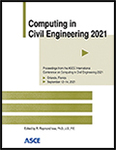Bayesian Inference for Uncertainty-Aware Post-Disaster Damage Assessment Using Artificial Intelligence
Publication: Computing in Civil Engineering 2021
ABSTRACT
Climate disasters cause significant loss of life and damage to properties and infrastructure. In a disaster aftermath, building inspectors conduct preliminary damage assessment (PDA), which, depending on the size and population of the affected areas, may be slow and resource-intensive. In this paper, we present an uncertainty-aware convolutional neural network (CNN) for PDA by incorporating a Bayesian framework and implementing Monte Carlo (MC) dropout sampling to efficiently approximate the Bayesian inferences. Using dropouts not only during training but also at the inference time allows the CNN model to represent softmax probabilities of the damage prediction as random variables, enabling a more rigorous and systematic characterization of uncertainty and confidence in model predictions. The model is trained and evaluated with non-deterministic ground-truth damage scores obtained through crowdsourcing from drone footage of a hurricane-affected area. Results indicate that the trained uncertainty-aware CNN model leads to more informed and reliable PDA outcomes.
Get full access to this chapter
View all available purchase options and get full access to this chapter.
REFERENCES
Abdar, M., Pourpanah, F., Hussain, S., Rezazadegan, D., Liu, L., Ghavamzadeh, M., Fieguth, P., Khosravi, A., Acharya, U. R., and Makarenkov, V. (2020). “A review of uncertainty quantification in deep learning: Techniques, applications and challenges.”.
Akter, S., and Wamba, S. F. (2019). “Big Data and Disaster Management: A Systematic Review and Agenda for Future Research.” Annals of Operations Research, 283(1), 939–959.
Bennett, D. (2020). “Five years later: Assessing the implementation of the four priorities of the Sendai framework for inclusion of people with disabilities.” International Journal of Disaster Risk Science, 1–12.
Cheng, C. S., Behzadan, A. H., and Noshadravan, A. (2021). “Deep learning for post‐hurricane aerial damage assessment of buildings.” Computer‐Aided Civil Infrastructure Engineering.
Chollet, F. (2017). Deep Learning with Python. Manning Publications Company.
Deng, J., Dong, W., Socher, R., Li, L., Kai, L., and Li, F.-F. “ImageNet: A Large-scale Hierarchical Image Database.” Proc., 2009 IEEE Conference on Computer Vision and Pattern Recognition, 248–255.
FEMA. (2003). “Multi-hazard Loss Estimation Methodology: Hurricane Model HAZUS-MH MR3, ”.
FEMA. (2020). FEMA Preliminary Damage Assessment Guide, Federal Emergency Management Agency.
Gal, Y. (2015). “What my deep model doesn’t know.”.
Gal, Y., and Ghahramani, Z. “Dropout as a bayesian approximation: Representing model uncertainty in deep learning.” Proc., international conference on machine learning, PMLR, 1050–1059.
Gupta, R., Hosfelt, R., Sajeev, S., Patel, N., Goodman, B., Doshi, J., Heim, E., Choset, H., and Gaston, M. (2019). “xBD: A Dataset for Assessing Building Damage from Satellite Imagery.”.
Harper, R., and Southern, J. (2020). “A bayesian deep learning framework for end-to-end prediction of emotion from heartbeat.” IEEE Transactions on Affective Computing.
Hou, L., Yu, C.-P., and Samaras, D. (2016). “Squared Earth Mover’s Distance-based Loss for Training Deep Neural Networks.”.
Howard, A. G., Zhu, M., Chen, B., Kalenichenko, D., Wang, W., Weyand, T., Andreetto, M., and Adam, H. (2017). “Mobilenets: Efficient Convolutional Neural Networks for Mobile Vision Applications.”.
Kendall, A., and Gal, Y. (2017). “What uncertainties do we need in bayesian deep learning for computer vision?”.
Khajwal, A. B., and Noshadravan, A. (2021). “An Uncertainty-aware Framework for Reliable Disaster Damage Assessment Via Crowdsourcing.” International Journal of Disaster Risk Reduction, 102110.
Kingma, D. P., and Ba, J. (2014). “Adam: A Method for Stochastic Optimization.”.
Levina, E., and Bickel, P. “The Earth Mover’s Distance is the Mallows Distance: Some Insights from Statistics.” Proc., Proceedings Eighth IEEE International Conference on Computer Vision. ICCV 2001, IEEE, 251–256.
Lindell, M. K., and Prater, C. S. (2003). “Assessing community impacts of natural disasters.” Assessing Community Impacts of Natural Disasters, 4(4), 176–185.
Mohammadi, M. E., Watson, D. P., and Wood, R. L. J. D. (2019). “Deep Learning-Based Damage Detection from Aerial SfM Point Clouds.” 3(3), 68.
Nex, F., Duarte, D., Tonolo, F. G., and Kerle, N. (2019). “Structural Building Damage Detection with Deep Learning: Assessment of a State-of-the-art CNN in Operational Conditions.” Remote Sensing, 11(23), 2765.
Norouzi, A., Emami, A., Najarian, K., Karimi, N., and Soroushmehr, S. R. “Exploiting Uncertainty of Deep Neural Networks for Improving Segmentation Accuracy in MRI Images.” Proc., ICASSP 2019-2019 IEEE International Conference on Acoustics, Speech and Signal Processing (ICASSP), IEEE, 2322–2326.
Peacock, W. G., Van Zandt, S., Zhang, Y., and Highfield, W. E. (2014). “Inequities in long-term housing recovery after disasters.” Journal of the American Planning Association, 80(4), 356–371.
Roy, A. G., Conjeti, S., Navab, N., Wachinger, C., and Alzheimer's Disease Neuroimaging Initiative. (2019). “Bayesian quicknat: model uncertainty in deep whole-brain segmentation for structure-wise quality control.” 195, 11–22.
Rubner, Y., Tomasi, C., and Guibas, L. J. (2000). “The Earth Mover’s Distance as A Metric for Image Retrieval.” International journal of computer vision, 40(2), 99–121.
Sajedi, S., and Liang, X. (2020). “Uncertainty‐assisted deep vision structural health monitoring.” Computer‐Aided Civil Infrastructure Engineering, 36(2), 126–142.
Sajedi, S., and Liang, X. (2021). “Dual Bayesian inference for risk‐informed vibration‐based damage diagnosis.” Computer‐Aided Civil Infrastructure Engineering.
Tompson, J., Goroshin, R., Jain, A., LeCun, Y., and Bregler, C. “Efficient object localization using convolutional networks.” Proc., Proceedings of the IEEE conference on computer vision and pattern recognition, 648–656.
Tousignant, A., Lemaître, P., Precup, D., Arnold, D. L., and Arbel, T. “Prediction of disease progression in multiple sclerosis patients using deep learning analysis of MRI data.” Proc., International Conference on Medical Imaging with Deep Learning, PMLR, 483–492.
Whitehill, J., Wu, T.-F., Bergsma, J., Movellan, J. R., and Ruvolo, P. L. “Whose vote should count more: Optimal integration of labels from labelers of unknown expertise.” Proc., Advances in neural information processing systems, 2035–2043.
Information & Authors
Information
Published In
History
Published online: May 24, 2022
Authors
Metrics & Citations
Metrics
Citations
Download citation
If you have the appropriate software installed, you can download article citation data to the citation manager of your choice. Simply select your manager software from the list below and click Download.
